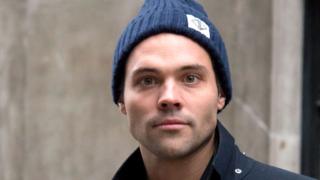Made In Chelsea’s Andy Jordan: Being an influencer made me ‘a puppet’

Image copyright
Getty Images
Andy Jordan didn’t even have an Instagram account before he started on Made in Chelsea in 2012.
“Overnight, there were hundreds of thousands of people watching what I was doing,” he says about appearing on the show.
He’s now got 290,000 followers.
“You’re like, ‘Everyone wants to follow me and talk to me’ – that’s almost like a drug,” he tells the Victoria Derbyshire programme and Panorama.
Andy was struggling. His TV persona and pushing out a constantly filtered life on Instagram were already taking their toll.
Selling things he didn’t believe in was the last straw.
He says he got to the point where he “just turned into a ghost… I didn’t even care if I got hit by a bus”.
Andy was promoting items you see on many Instagram influencers’ accounts, such as teeth-whitening products and protein supplements.
“It’s the easiest money I’ve ever made,” he says.
“There were a couple that were £500 for a picture – the most would have been about £2,000.”
- Watch Panorama: Million Pound Selfie Sell-Off on BBC iPlayer
He adds: “I just did what I was told… Obviously the management want you to do these things because they make money off it.”
Andy doesn’t go to the gym, but was still asked to advertise a protein supplement.
“I was like, ‘This is insane’, because I didn’t work out. My agent was like, ‘Well pretend you work out’.”
Image copyright
Getty Images
Andy Jordan (in the denim jacket) left Made in Chelsea in 2015
It got to the point where Andy went into a gym just to take a photo of the product on the gym equipment. But that’s not the weirdest request he’s had.
“I’ve been asked to have cosmetic surgery before,” he told us.
“I’ve been asked if I’ll have liposuction at a particular clinic, and then document about the process.” Andy said no to that request.
He was making money, but the constant selling took its toll on Andy.
At the same time, he was starring in Made In Chelsea, a scripted show made to look like reality TV.
“You just become a puppet… you’re literally like the packaging,” he says.
“I’d lost who I was because everything was directed by someone else.”
Image copyright
Getty Images
Andy has a music career and runs a clothing company
Andy also became concerned at the effect his filtered life was having on his followers.
More than half of 18 to 34-year-olds feel that reality TV and social media have a negative effect on how they see their bodies, a BBC survey found last year.
“I genuinely think that people could die as a result of the phenomenon that is social media,” he says.
“If you’re constantly surrounded by a world that’s better than you, or looks nicer than you, or has a faster car than you – that’s when you suddenly go, ‘Wow, I’m useless’.”
Andy is annoyed at himself “for not fully understanding what I was doing from day one”.
He still posts on Instagram and still does paid posts – just not for teeth whiteners and protein shakes any more.
“At least now if I’m promoting something, it’s something that I’m passionate about,” he says.
But a story he tells shows the effect people like him may have had on other people – even children.
“I had a chat with some family friends and I was talking to a child who’s seven or eight years old.
“I said, ‘What do you want to do when you’re older?’ and he was like… ‘Well, I just want to be an Instagrammer.’
“I was like… ‘That’s not a real job’.
“That’s when I was like, ‘Whoa, this culture is really scary’.”
Follow Newsbeat on Instagram, Facebook and Twitter.
Listen to Newsbeat live at 12:45 and 17:45 every weekday on BBC Radio 1 and 1Xtra – if you miss us you can listen back here.
